1 - Expected post-Chinafy results
4 Tips to Make Your Website Load Faster in China
A website that performs well globally may be slow or even unusable in China. So how can you ensure your site offers the same experience for users in China as it does the rest of the world?
TL;DR to make your website load faster in China you could use a China CDN, minimize blocked third-party resources like Google APIs, or consider hosting in China, although this comes with significant financial and regulatory hurdles like obtaining an ICP license. Alternatively, Chinafy offers a complete solution that optimizes your site for China without requiring onshore hosting or licenses.
This short guide will explore why websites often don’t work as expected in China, how you can test your website, and how you can make your website load faster in China.
Why websites load slowly in China
While some websites are officially blocked in China, most others simply just don’t work well because they’re not optimized for the Chinese internet. Those that suffer from poor performance in China do so due to two primary reasons: code incompatibility and infrastructure limitations.
Code incompatibility
Websites built with third-party resources such as Google APIs, Facebook trackers, and YouTube videos encounter delays or even fail to load in China.
These resources are blocked by China, creating bottlenecks in the loading process.
When a browser tries to retrieve blocked content, it gets “stuck,” leading to delays of 30 seconds or more.
Infrastructure incompatibility
Hosting your website outside of China creates additional latency due to the physical distance between your servers and the end users in China.
Even with global CDNs, the majority do not have Points of Presence (PoPs) inside China and so the distance slows down site performance.
Test your website from China
Here are two speed tests for you to test your website performance from China:
Global speed test - test your site from 18 servers around the world including Beijing, Shanghai, Guangzhou, China.
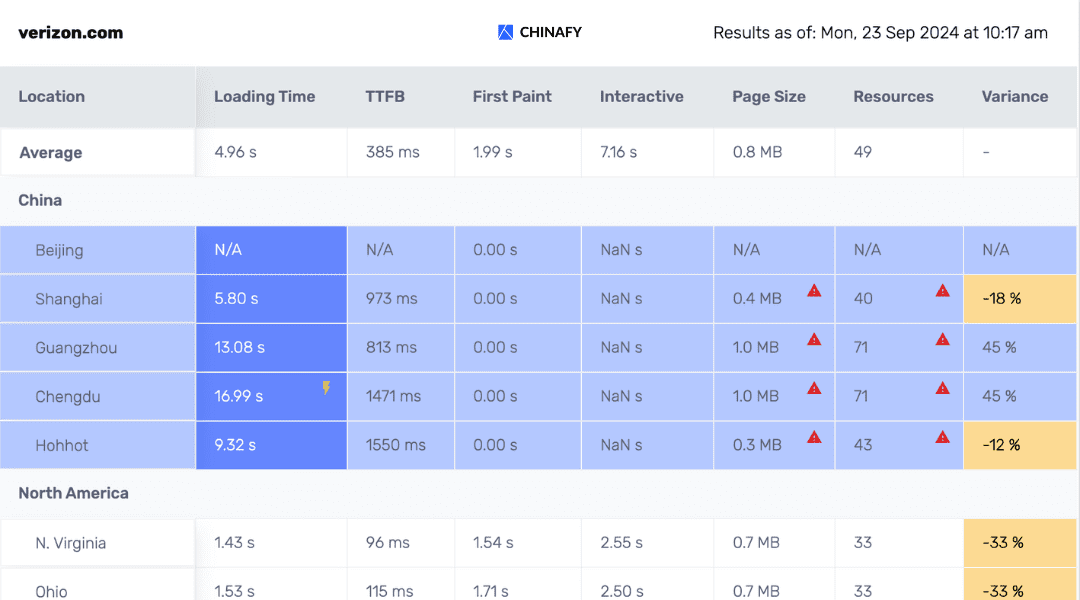
Image source: Chinafy
Visual speed test - watch and compare your site as it loads in real-time in the US vs China.
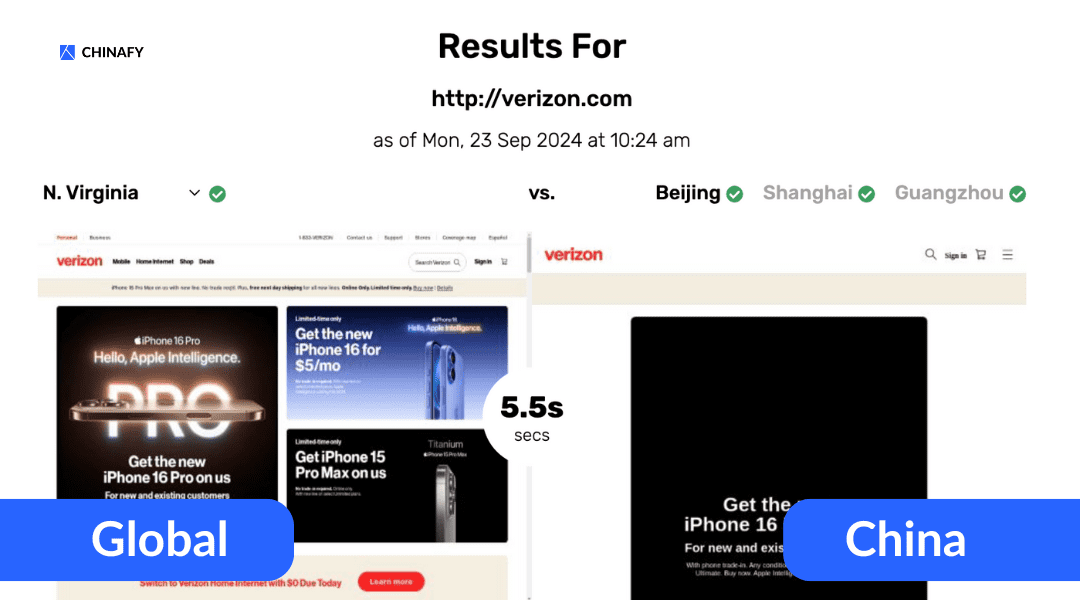
Image source: Chinafy
Make your website load faster in China
Once you identify website performance issues in China, you can start considering how you want to resolve these.
Tip #1: Use a China-compatible CDN
Most global CDNs don’t include servers in China by default. Using a China CDN provider can help reduce latency and improve delivery speeds. Some of the popular CDN providers in China include:
To use these services, China has certain requirements including a China business entity, ICP filing or license, PSB filing, China IP address and more. It’s also important to note that CDNs alone cannot solve all performance issues, as they won’t accelerate third-party resources that are blocked in China.
Tip #2: Minimize restricted third-party resources
Some common third-party elements that may be stalling your site’s load time in China include:
Google APIs (e.g. jQuery, Google Maps)
Social media plugins like Facebook, Instagram and Twitter
YouTube or Vimeo embeds
Google reCAPTCHA for form verification
External fonts hosted by services like Google Fonts
There are hundreds more lesser known third-party resources that are restricted in China that may be causing your site performance to suffer.
How to identify third-party resources on your website
A quick way to see whether your site uses any of these third-party resources is to right-click on your website home page and click “Inspect”.
In the top navigation of the inspection window, click “Network”.
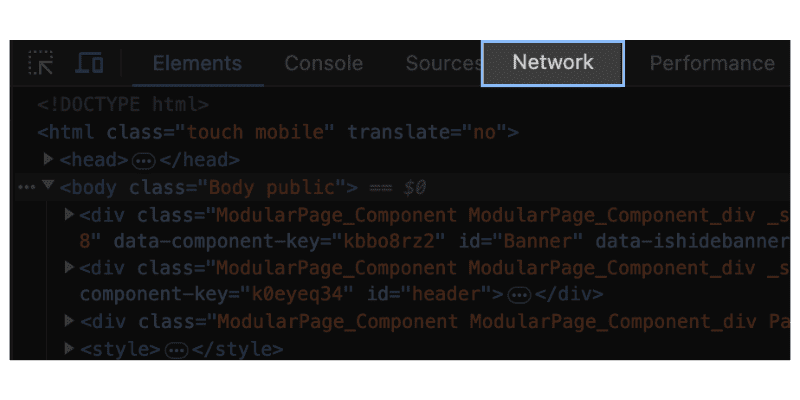
If the “Domain” column is not already showing, right click on the column headings and select “Domain” from the dropdown so that it appears as a column in the table.
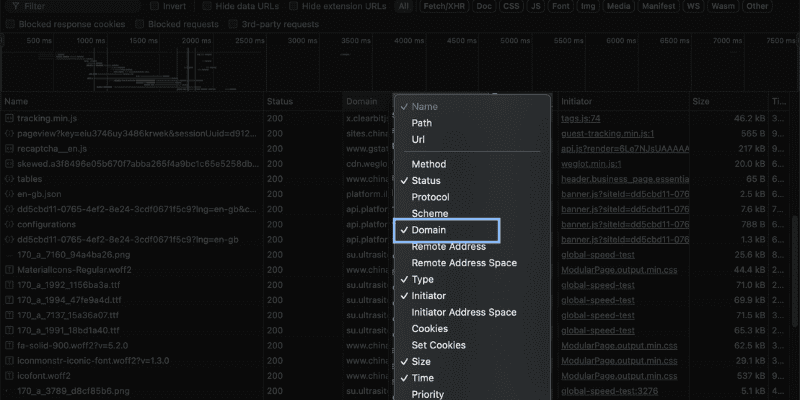
After refreshing your webpage, you should be able to identify any domains that belong to third-party services like Google, Vimeo, and YouTube. Here’s an incomplete list of domains that are officially blocked in mainland China.
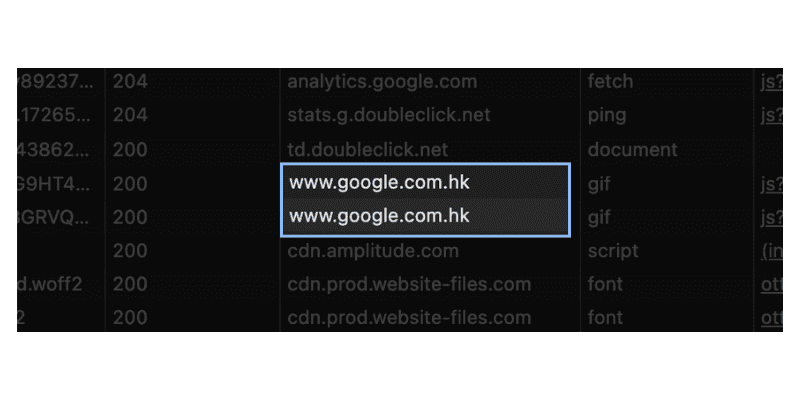
Why do third-party resources make a website slow or inaccessible in China?
When a browser in China requests a web page, the first step is to resolve the domain names of all resources the page references, including third-party ones like Google APIs.
For resources like Google APIs, DNS requests are typically blocked by China’s "Great Firewall". This leads to delays, as the browser keeps trying to resolve the blocked domain.
After multiple failed attempts to reach the Google APIs (or any other blocked third-party service), the browser will eventually time out.
You can replace these elements with China-friendly alternatives or remove them entirely to prevent your site from getting “stuck” when trying to load blocked content.
Potential complications of editing third party resources on your existing site
It wouldn’t make sense to completely tailor your existing site to a Chinese audience, as this would be detrimental to its global visitors. The same goes for its code and infrastructure:
The tools that are best practice in China are not necessarily the best practice tools for web development outside of China. Manually making changes to cater to the China audience on your global website may compromise the way your website works for visitors outside of China.
The way third party resources work in China differ and evolve over time. Meaning, there is no one-off list or means to edit these resources on your website. Changes will likely have to be made on an ongoing basis.
To have peace of mind that everything is running as it should do in China, it’s important to have someone on your team with expert knowledge of the China development ecosystem and ability to test the site on an ongoing basis in China across various networks, browsers and devices.
Tip #3: Consider hosting in China
For businesses with a strong focus on the Chinese market or products catered only to the China audience, hosting in China may be a viable option. However, it may come with significant regulatory and operational challenges depending on your company.
Setting up a local entity or partnering with a Chinese company.
Acquiring an ICP (Internet Content Provider) license.
You’ll need to choose a Chinese hosting provider, such as Alibaba Cloud, Tencent Cloud, or Huawei Cloud, to host your website.
Businesses that choose to host locally must also manage blocked resources continuously to keep their site optimized.
Requirements and specifics may vary depending on your industry.
Like with using a China CDN, hosting your site in China doesn't automatically make it work there. It’s still necessary to optimize your website for third-party dependencies, content compliance and user experience.
Tip #4: Use Chinafy as a complete solution
If you’re looking for a faster, low-hassle way to enhance your website's performance in China, Chinafy offers a fully-managed, all-in-one solution that doesn’t require you to host your site in China or obtain an ICP license.
Chinafy is the only platform to detect, address, replace or remove third party resources that impact both speed and functionality specifically for a website in China. With little to no input from your IT team and without changing your global site, Chinafy implements intelligent rule-based optimizations to fine tune your site specifically for users in China.
Chinafy can be used with platforms like WordPress, Shopify, and custom-built sites, addressing both incompatible resources and performance issues with a near-China CDN. This results in websites that load up to 6-8 times on average faster for users in China. Perhaps more importantly, this results in websites that also function the way they’re designed to.
With a quick setup process of just 2 weeks, Chinafy delivers a solution that reduces the time, cost and complexity of optimizing your site for China.
Chinafy’s bolt-on approach gives you a faster, full, and secure website in China with minimal effort for you or your IT team.
Get started with Chinafy to make your site work faster and fully in China.



1 - Expected post-Chinafy results






























